Human Resource Management Case Study 2022
VerifiedAdded on 2022/10/04
|12
|3297
|32
AI Summary
Contribute Materials
Your contribution can guide someone’s learning journey. Share your
documents today.
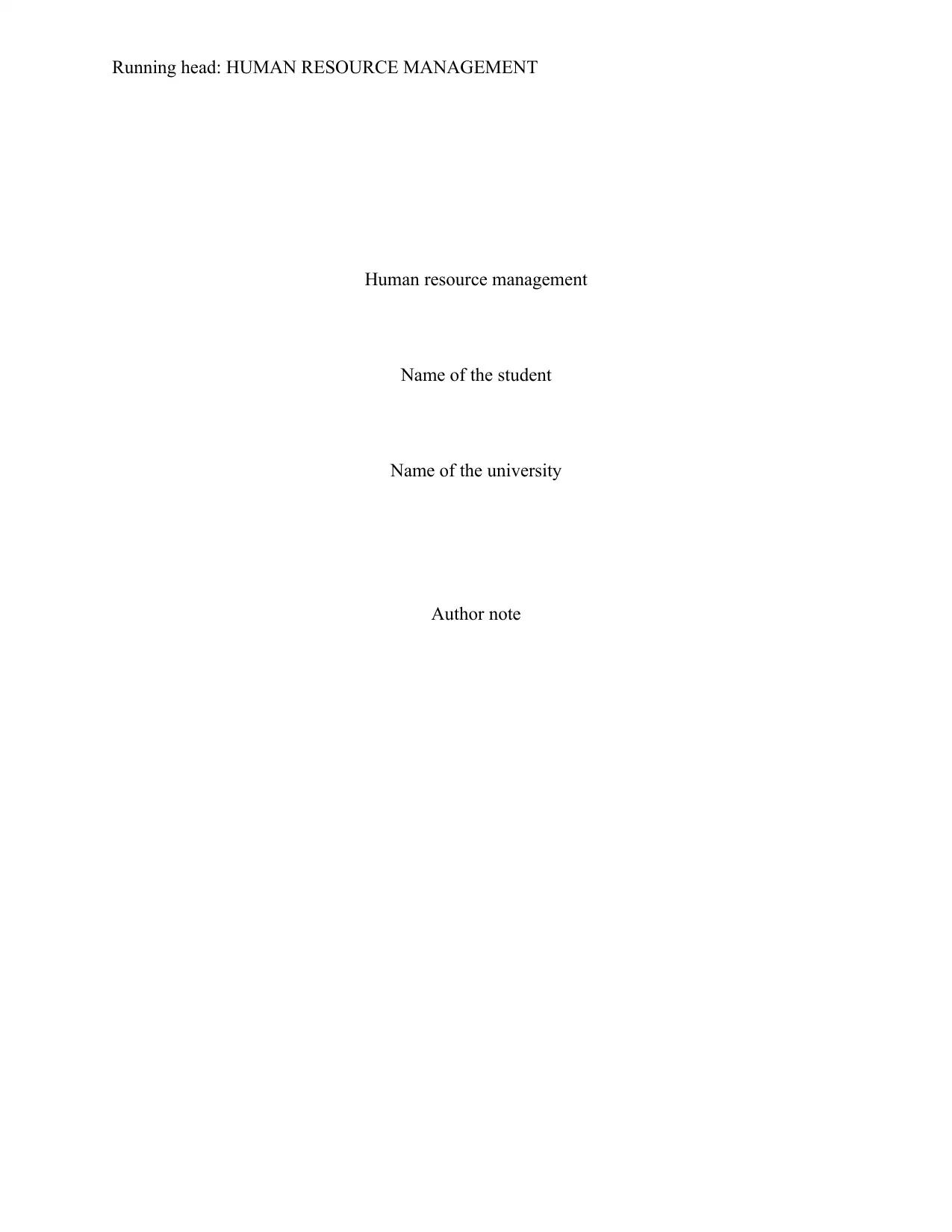
Running head: HUMAN RESOURCE MANAGEMENT
Human resource management
Name of the student
Name of the university
Author note
Human resource management
Name of the student
Name of the university
Author note
Secure Best Marks with AI Grader
Need help grading? Try our AI Grader for instant feedback on your assignments.
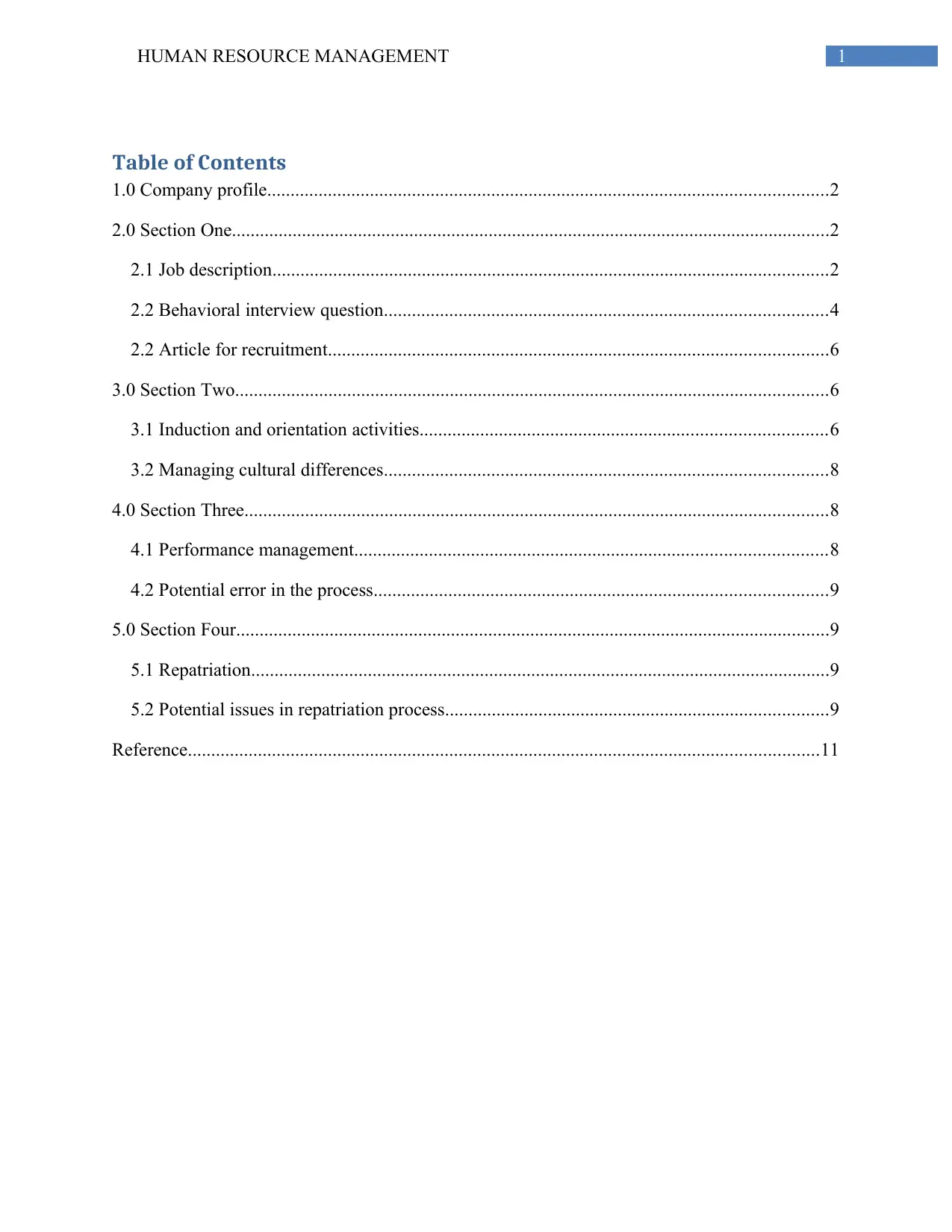
1HUMAN RESOURCE MANAGEMENT
Table of Contents
1.0 Company profile........................................................................................................................2
2.0 Section One................................................................................................................................2
2.1 Job description.......................................................................................................................2
2.2 Behavioral interview question...............................................................................................4
2.2 Article for recruitment...........................................................................................................6
3.0 Section Two...............................................................................................................................6
3.1 Induction and orientation activities.......................................................................................6
3.2 Managing cultural differences...............................................................................................8
4.0 Section Three.............................................................................................................................8
4.1 Performance management.....................................................................................................8
4.2 Potential error in the process.................................................................................................9
5.0 Section Four...............................................................................................................................9
5.1 Repatriation............................................................................................................................9
5.2 Potential issues in repatriation process..................................................................................9
Reference.......................................................................................................................................11
Table of Contents
1.0 Company profile........................................................................................................................2
2.0 Section One................................................................................................................................2
2.1 Job description.......................................................................................................................2
2.2 Behavioral interview question...............................................................................................4
2.2 Article for recruitment...........................................................................................................6
3.0 Section Two...............................................................................................................................6
3.1 Induction and orientation activities.......................................................................................6
3.2 Managing cultural differences...............................................................................................8
4.0 Section Three.............................................................................................................................8
4.1 Performance management.....................................................................................................8
4.2 Potential error in the process.................................................................................................9
5.0 Section Four...............................................................................................................................9
5.1 Repatriation............................................................................................................................9
5.2 Potential issues in repatriation process..................................................................................9
Reference.......................................................................................................................................11
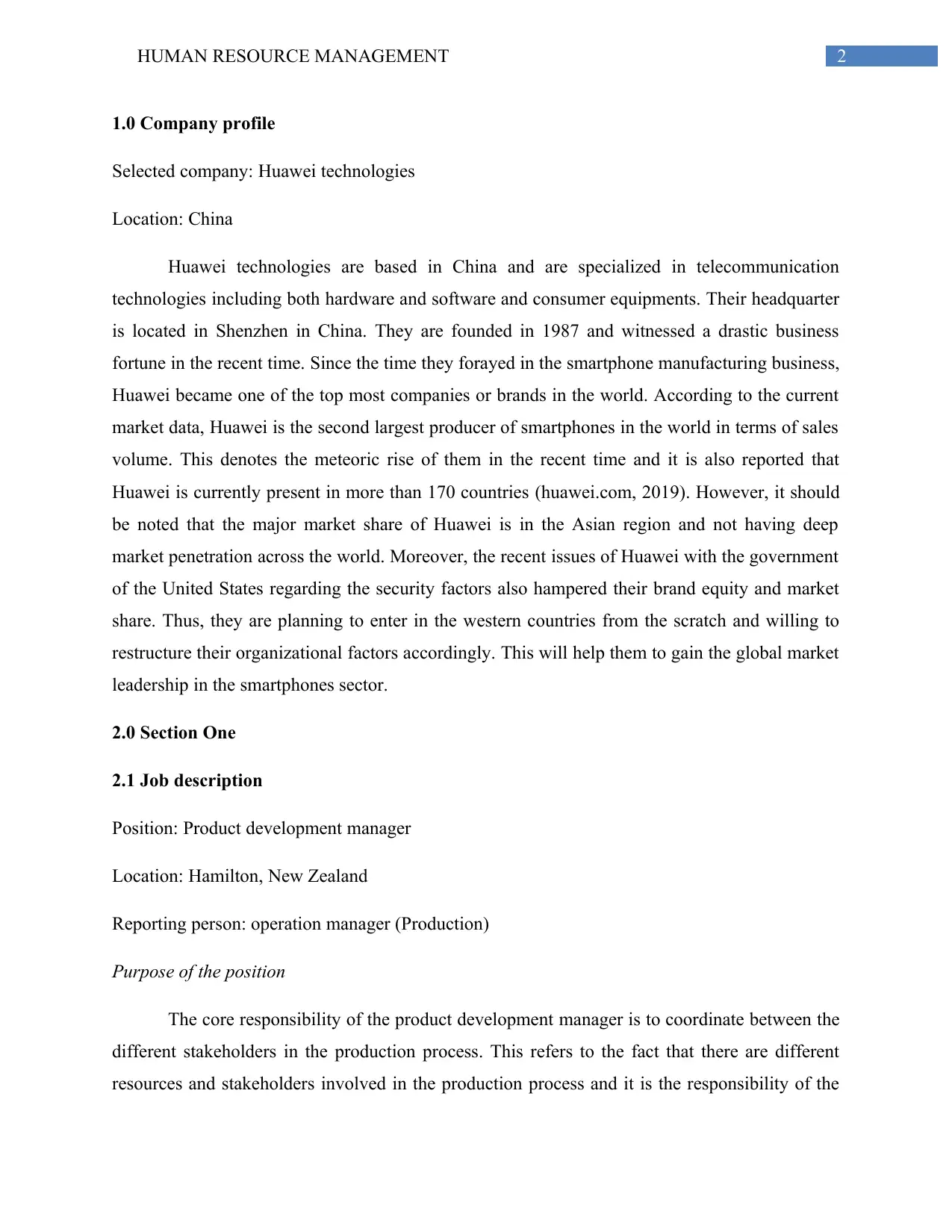
2HUMAN RESOURCE MANAGEMENT
1.0 Company profile
Selected company: Huawei technologies
Location: China
Huawei technologies are based in China and are specialized in telecommunication
technologies including both hardware and software and consumer equipments. Their headquarter
is located in Shenzhen in China. They are founded in 1987 and witnessed a drastic business
fortune in the recent time. Since the time they forayed in the smartphone manufacturing business,
Huawei became one of the top most companies or brands in the world. According to the current
market data, Huawei is the second largest producer of smartphones in the world in terms of sales
volume. This denotes the meteoric rise of them in the recent time and it is also reported that
Huawei is currently present in more than 170 countries (huawei.com, 2019). However, it should
be noted that the major market share of Huawei is in the Asian region and not having deep
market penetration across the world. Moreover, the recent issues of Huawei with the government
of the United States regarding the security factors also hampered their brand equity and market
share. Thus, they are planning to enter in the western countries from the scratch and willing to
restructure their organizational factors accordingly. This will help them to gain the global market
leadership in the smartphones sector.
2.0 Section One
2.1 Job description
Position: Product development manager
Location: Hamilton, New Zealand
Reporting person: operation manager (Production)
Purpose of the position
The core responsibility of the product development manager is to coordinate between the
different stakeholders in the production process. This refers to the fact that there are different
resources and stakeholders involved in the production process and it is the responsibility of the
1.0 Company profile
Selected company: Huawei technologies
Location: China
Huawei technologies are based in China and are specialized in telecommunication
technologies including both hardware and software and consumer equipments. Their headquarter
is located in Shenzhen in China. They are founded in 1987 and witnessed a drastic business
fortune in the recent time. Since the time they forayed in the smartphone manufacturing business,
Huawei became one of the top most companies or brands in the world. According to the current
market data, Huawei is the second largest producer of smartphones in the world in terms of sales
volume. This denotes the meteoric rise of them in the recent time and it is also reported that
Huawei is currently present in more than 170 countries (huawei.com, 2019). However, it should
be noted that the major market share of Huawei is in the Asian region and not having deep
market penetration across the world. Moreover, the recent issues of Huawei with the government
of the United States regarding the security factors also hampered their brand equity and market
share. Thus, they are planning to enter in the western countries from the scratch and willing to
restructure their organizational factors accordingly. This will help them to gain the global market
leadership in the smartphones sector.
2.0 Section One
2.1 Job description
Position: Product development manager
Location: Hamilton, New Zealand
Reporting person: operation manager (Production)
Purpose of the position
The core responsibility of the product development manager is to coordinate between the
different stakeholders in the production process. This refers to the fact that there are different
resources and stakeholders involved in the production process and it is the responsibility of the
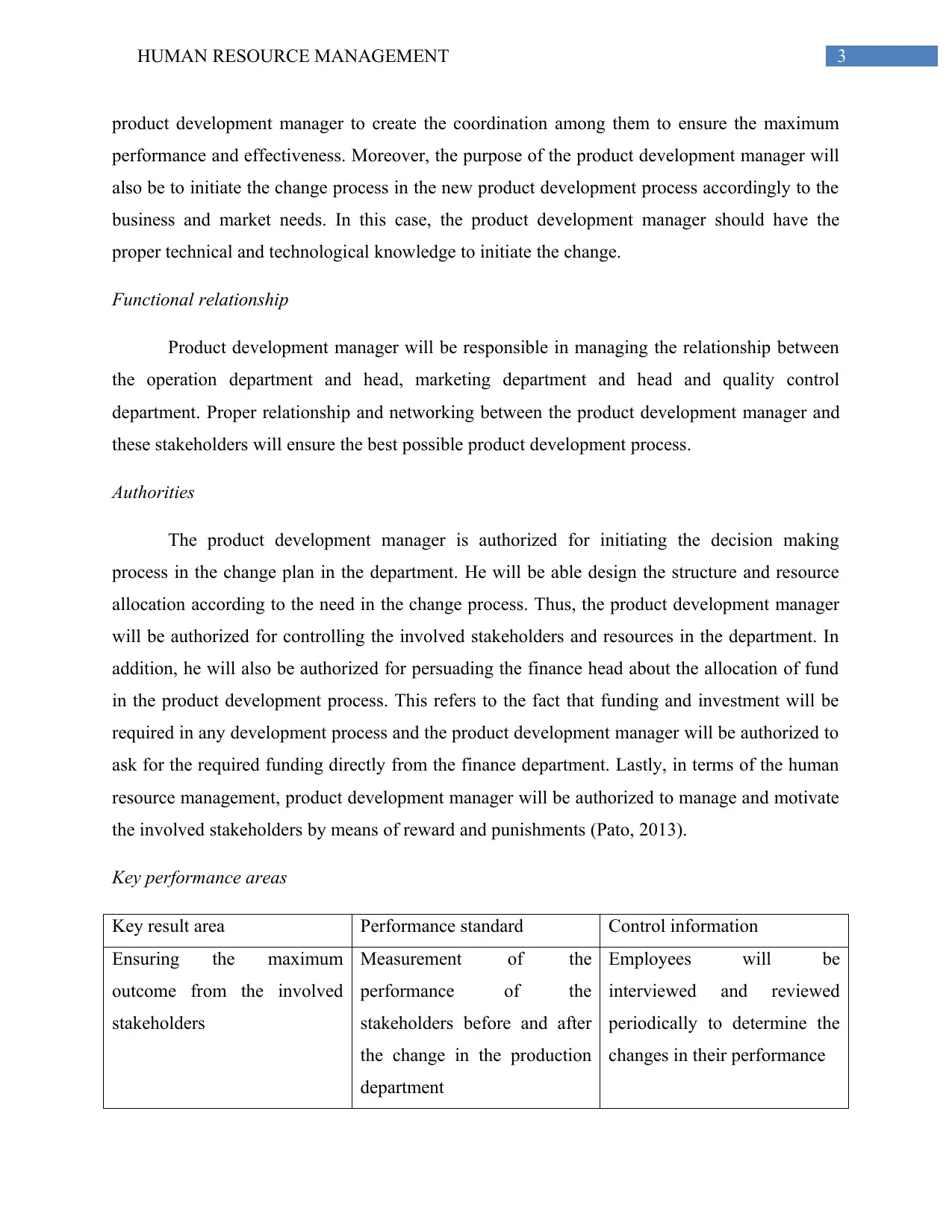
3HUMAN RESOURCE MANAGEMENT
product development manager to create the coordination among them to ensure the maximum
performance and effectiveness. Moreover, the purpose of the product development manager will
also be to initiate the change process in the new product development process accordingly to the
business and market needs. In this case, the product development manager should have the
proper technical and technological knowledge to initiate the change.
Functional relationship
Product development manager will be responsible in managing the relationship between
the operation department and head, marketing department and head and quality control
department. Proper relationship and networking between the product development manager and
these stakeholders will ensure the best possible product development process.
Authorities
The product development manager is authorized for initiating the decision making
process in the change plan in the department. He will be able design the structure and resource
allocation according to the need in the change process. Thus, the product development manager
will be authorized for controlling the involved stakeholders and resources in the department. In
addition, he will also be authorized for persuading the finance head about the allocation of fund
in the product development process. This refers to the fact that funding and investment will be
required in any development process and the product development manager will be authorized to
ask for the required funding directly from the finance department. Lastly, in terms of the human
resource management, product development manager will be authorized to manage and motivate
the involved stakeholders by means of reward and punishments (Pato, 2013).
Key performance areas
Key result area Performance standard Control information
Ensuring the maximum
outcome from the involved
stakeholders
Measurement of the
performance of the
stakeholders before and after
the change in the production
department
Employees will be
interviewed and reviewed
periodically to determine the
changes in their performance
product development manager to create the coordination among them to ensure the maximum
performance and effectiveness. Moreover, the purpose of the product development manager will
also be to initiate the change process in the new product development process accordingly to the
business and market needs. In this case, the product development manager should have the
proper technical and technological knowledge to initiate the change.
Functional relationship
Product development manager will be responsible in managing the relationship between
the operation department and head, marketing department and head and quality control
department. Proper relationship and networking between the product development manager and
these stakeholders will ensure the best possible product development process.
Authorities
The product development manager is authorized for initiating the decision making
process in the change plan in the department. He will be able design the structure and resource
allocation according to the need in the change process. Thus, the product development manager
will be authorized for controlling the involved stakeholders and resources in the department. In
addition, he will also be authorized for persuading the finance head about the allocation of fund
in the product development process. This refers to the fact that funding and investment will be
required in any development process and the product development manager will be authorized to
ask for the required funding directly from the finance department. Lastly, in terms of the human
resource management, product development manager will be authorized to manage and motivate
the involved stakeholders by means of reward and punishments (Pato, 2013).
Key performance areas
Key result area Performance standard Control information
Ensuring the maximum
outcome from the involved
stakeholders
Measurement of the
performance of the
stakeholders before and after
the change in the production
department
Employees will be
interviewed and reviewed
periodically to determine the
changes in their performance
Secure Best Marks with AI Grader
Need help grading? Try our AI Grader for instant feedback on your assignments.
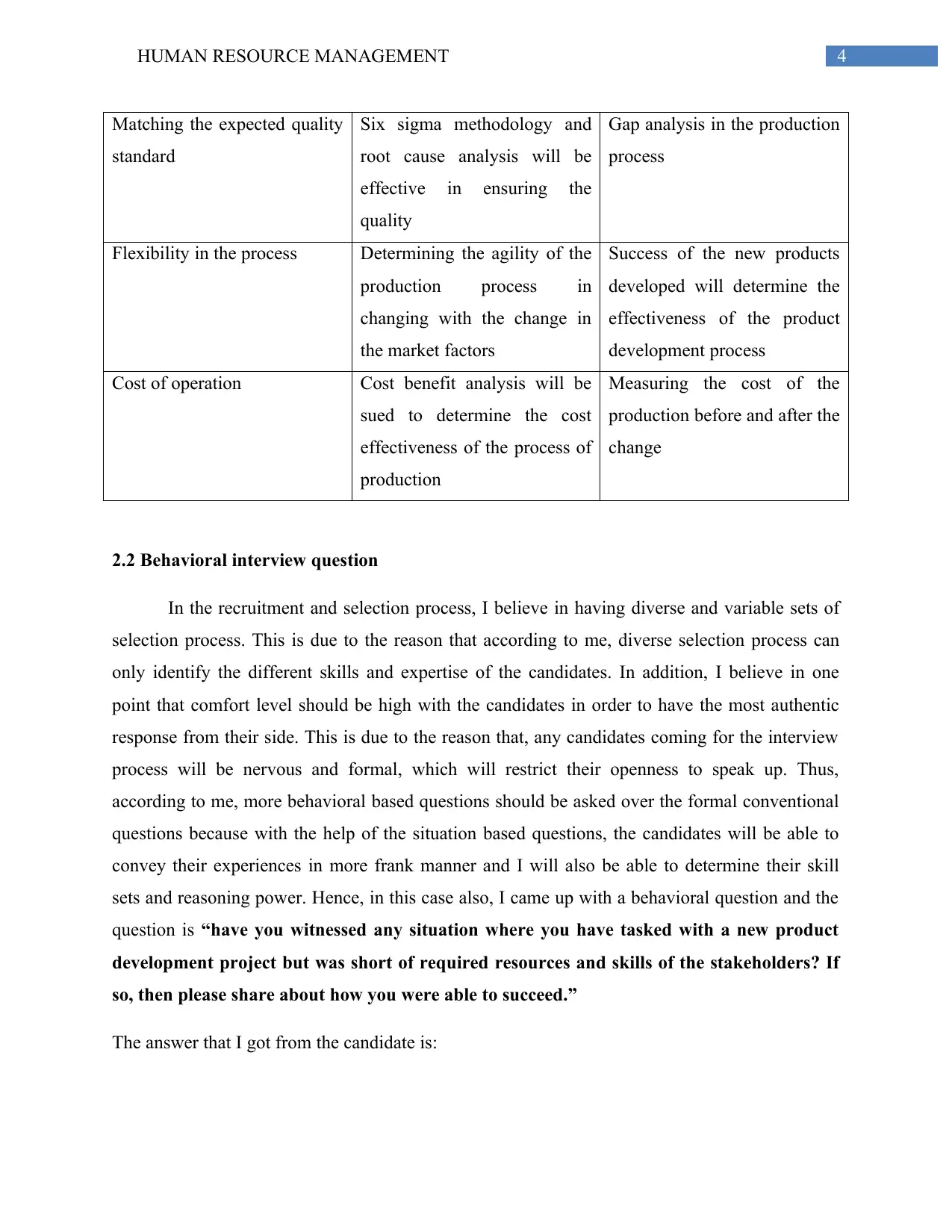
4HUMAN RESOURCE MANAGEMENT
Matching the expected quality
standard
Six sigma methodology and
root cause analysis will be
effective in ensuring the
quality
Gap analysis in the production
process
Flexibility in the process Determining the agility of the
production process in
changing with the change in
the market factors
Success of the new products
developed will determine the
effectiveness of the product
development process
Cost of operation Cost benefit analysis will be
sued to determine the cost
effectiveness of the process of
production
Measuring the cost of the
production before and after the
change
2.2 Behavioral interview question
In the recruitment and selection process, I believe in having diverse and variable sets of
selection process. This is due to the reason that according to me, diverse selection process can
only identify the different skills and expertise of the candidates. In addition, I believe in one
point that comfort level should be high with the candidates in order to have the most authentic
response from their side. This is due to the reason that, any candidates coming for the interview
process will be nervous and formal, which will restrict their openness to speak up. Thus,
according to me, more behavioral based questions should be asked over the formal conventional
questions because with the help of the situation based questions, the candidates will be able to
convey their experiences in more frank manner and I will also be able to determine their skill
sets and reasoning power. Hence, in this case also, I came up with a behavioral question and the
question is “have you witnessed any situation where you have tasked with a new product
development project but was short of required resources and skills of the stakeholders? If
so, then please share about how you were able to succeed.”
The answer that I got from the candidate is:
Matching the expected quality
standard
Six sigma methodology and
root cause analysis will be
effective in ensuring the
quality
Gap analysis in the production
process
Flexibility in the process Determining the agility of the
production process in
changing with the change in
the market factors
Success of the new products
developed will determine the
effectiveness of the product
development process
Cost of operation Cost benefit analysis will be
sued to determine the cost
effectiveness of the process of
production
Measuring the cost of the
production before and after the
change
2.2 Behavioral interview question
In the recruitment and selection process, I believe in having diverse and variable sets of
selection process. This is due to the reason that according to me, diverse selection process can
only identify the different skills and expertise of the candidates. In addition, I believe in one
point that comfort level should be high with the candidates in order to have the most authentic
response from their side. This is due to the reason that, any candidates coming for the interview
process will be nervous and formal, which will restrict their openness to speak up. Thus,
according to me, more behavioral based questions should be asked over the formal conventional
questions because with the help of the situation based questions, the candidates will be able to
convey their experiences in more frank manner and I will also be able to determine their skill
sets and reasoning power. Hence, in this case also, I came up with a behavioral question and the
question is “have you witnessed any situation where you have tasked with a new product
development project but was short of required resources and skills of the stakeholders? If
so, then please share about how you were able to succeed.”
The answer that I got from the candidate is:
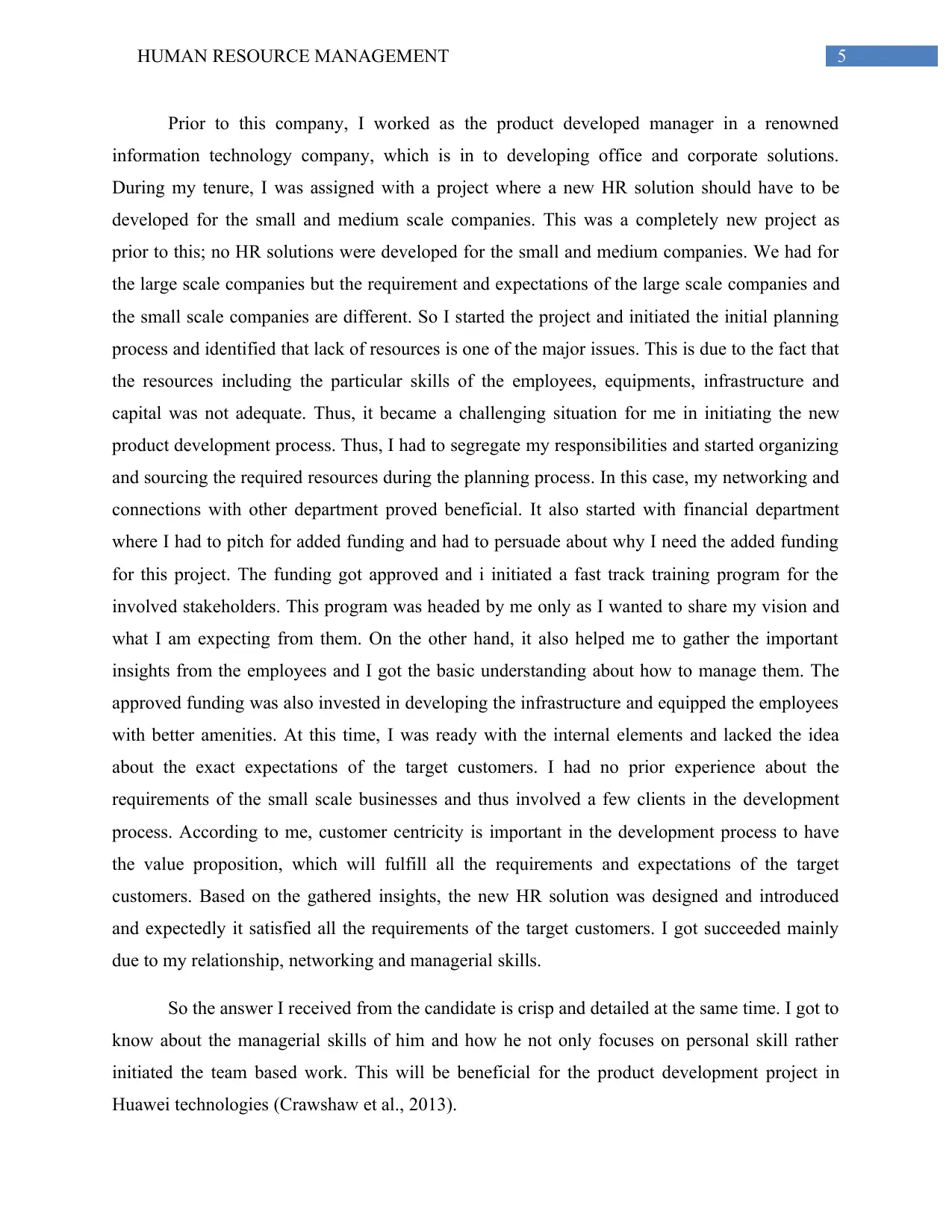
5HUMAN RESOURCE MANAGEMENT
Prior to this company, I worked as the product developed manager in a renowned
information technology company, which is in to developing office and corporate solutions.
During my tenure, I was assigned with a project where a new HR solution should have to be
developed for the small and medium scale companies. This was a completely new project as
prior to this; no HR solutions were developed for the small and medium companies. We had for
the large scale companies but the requirement and expectations of the large scale companies and
the small scale companies are different. So I started the project and initiated the initial planning
process and identified that lack of resources is one of the major issues. This is due to the fact that
the resources including the particular skills of the employees, equipments, infrastructure and
capital was not adequate. Thus, it became a challenging situation for me in initiating the new
product development process. Thus, I had to segregate my responsibilities and started organizing
and sourcing the required resources during the planning process. In this case, my networking and
connections with other department proved beneficial. It also started with financial department
where I had to pitch for added funding and had to persuade about why I need the added funding
for this project. The funding got approved and i initiated a fast track training program for the
involved stakeholders. This program was headed by me only as I wanted to share my vision and
what I am expecting from them. On the other hand, it also helped me to gather the important
insights from the employees and I got the basic understanding about how to manage them. The
approved funding was also invested in developing the infrastructure and equipped the employees
with better amenities. At this time, I was ready with the internal elements and lacked the idea
about the exact expectations of the target customers. I had no prior experience about the
requirements of the small scale businesses and thus involved a few clients in the development
process. According to me, customer centricity is important in the development process to have
the value proposition, which will fulfill all the requirements and expectations of the target
customers. Based on the gathered insights, the new HR solution was designed and introduced
and expectedly it satisfied all the requirements of the target customers. I got succeeded mainly
due to my relationship, networking and managerial skills.
So the answer I received from the candidate is crisp and detailed at the same time. I got to
know about the managerial skills of him and how he not only focuses on personal skill rather
initiated the team based work. This will be beneficial for the product development project in
Huawei technologies (Crawshaw et al., 2013).
Prior to this company, I worked as the product developed manager in a renowned
information technology company, which is in to developing office and corporate solutions.
During my tenure, I was assigned with a project where a new HR solution should have to be
developed for the small and medium scale companies. This was a completely new project as
prior to this; no HR solutions were developed for the small and medium companies. We had for
the large scale companies but the requirement and expectations of the large scale companies and
the small scale companies are different. So I started the project and initiated the initial planning
process and identified that lack of resources is one of the major issues. This is due to the fact that
the resources including the particular skills of the employees, equipments, infrastructure and
capital was not adequate. Thus, it became a challenging situation for me in initiating the new
product development process. Thus, I had to segregate my responsibilities and started organizing
and sourcing the required resources during the planning process. In this case, my networking and
connections with other department proved beneficial. It also started with financial department
where I had to pitch for added funding and had to persuade about why I need the added funding
for this project. The funding got approved and i initiated a fast track training program for the
involved stakeholders. This program was headed by me only as I wanted to share my vision and
what I am expecting from them. On the other hand, it also helped me to gather the important
insights from the employees and I got the basic understanding about how to manage them. The
approved funding was also invested in developing the infrastructure and equipped the employees
with better amenities. At this time, I was ready with the internal elements and lacked the idea
about the exact expectations of the target customers. I had no prior experience about the
requirements of the small scale businesses and thus involved a few clients in the development
process. According to me, customer centricity is important in the development process to have
the value proposition, which will fulfill all the requirements and expectations of the target
customers. Based on the gathered insights, the new HR solution was designed and introduced
and expectedly it satisfied all the requirements of the target customers. I got succeeded mainly
due to my relationship, networking and managerial skills.
So the answer I received from the candidate is crisp and detailed at the same time. I got to
know about the managerial skills of him and how he not only focuses on personal skill rather
initiated the team based work. This will be beneficial for the product development project in
Huawei technologies (Crawshaw et al., 2013).
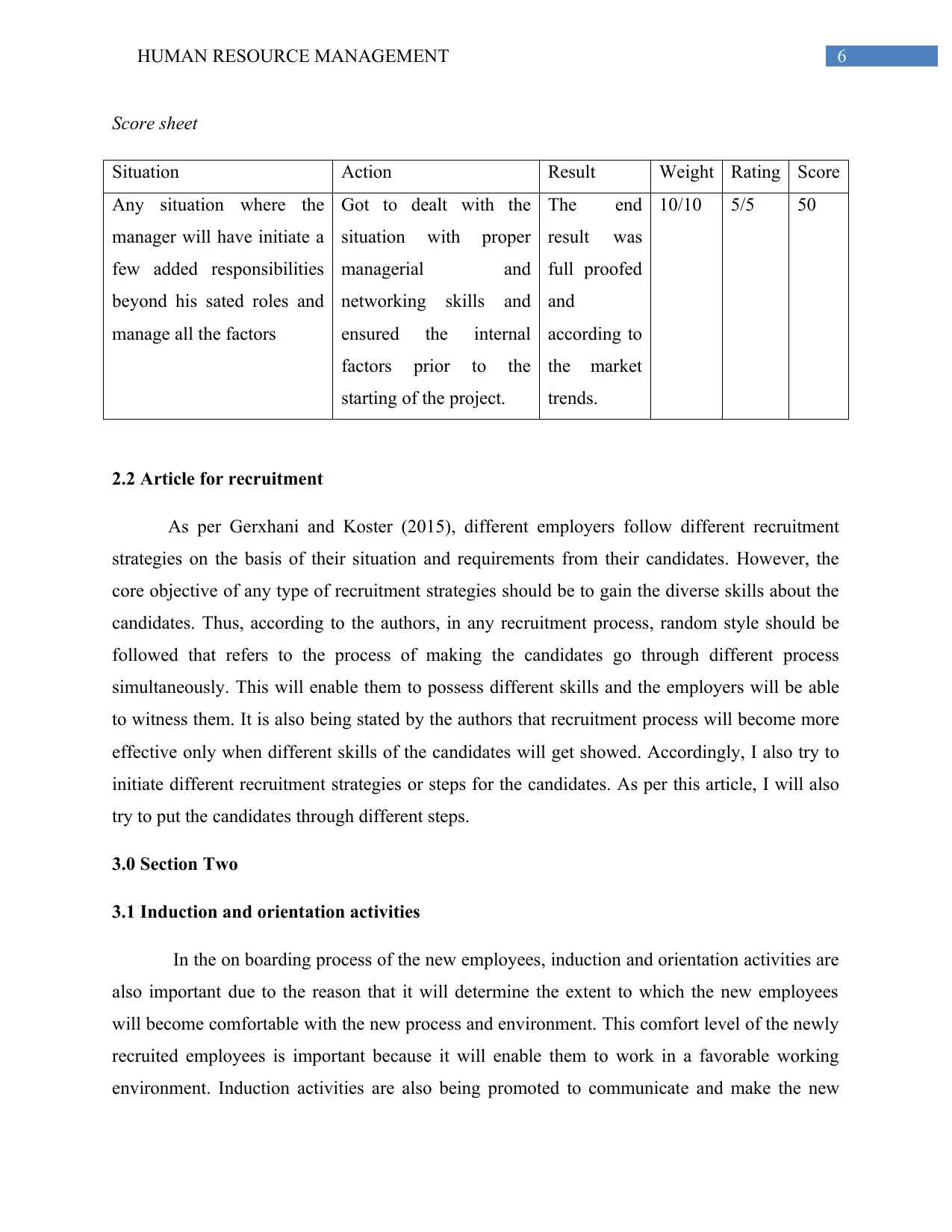
6HUMAN RESOURCE MANAGEMENT
Score sheet
Situation Action Result Weight Rating Score
Any situation where the
manager will have initiate a
few added responsibilities
beyond his sated roles and
manage all the factors
Got to dealt with the
situation with proper
managerial and
networking skills and
ensured the internal
factors prior to the
starting of the project.
The end
result was
full proofed
and
according to
the market
trends.
10/10 5/5 50
2.2 Article for recruitment
As per Gerxhani and Koster (2015), different employers follow different recruitment
strategies on the basis of their situation and requirements from their candidates. However, the
core objective of any type of recruitment strategies should be to gain the diverse skills about the
candidates. Thus, according to the authors, in any recruitment process, random style should be
followed that refers to the process of making the candidates go through different process
simultaneously. This will enable them to possess different skills and the employers will be able
to witness them. It is also being stated by the authors that recruitment process will become more
effective only when different skills of the candidates will get showed. Accordingly, I also try to
initiate different recruitment strategies or steps for the candidates. As per this article, I will also
try to put the candidates through different steps.
3.0 Section Two
3.1 Induction and orientation activities
In the on boarding process of the new employees, induction and orientation activities are
also important due to the reason that it will determine the extent to which the new employees
will become comfortable with the new process and environment. This comfort level of the newly
recruited employees is important because it will enable them to work in a favorable working
environment. Induction activities are also being promoted to communicate and make the new
Score sheet
Situation Action Result Weight Rating Score
Any situation where the
manager will have initiate a
few added responsibilities
beyond his sated roles and
manage all the factors
Got to dealt with the
situation with proper
managerial and
networking skills and
ensured the internal
factors prior to the
starting of the project.
The end
result was
full proofed
and
according to
the market
trends.
10/10 5/5 50
2.2 Article for recruitment
As per Gerxhani and Koster (2015), different employers follow different recruitment
strategies on the basis of their situation and requirements from their candidates. However, the
core objective of any type of recruitment strategies should be to gain the diverse skills about the
candidates. Thus, according to the authors, in any recruitment process, random style should be
followed that refers to the process of making the candidates go through different process
simultaneously. This will enable them to possess different skills and the employers will be able
to witness them. It is also being stated by the authors that recruitment process will become more
effective only when different skills of the candidates will get showed. Accordingly, I also try to
initiate different recruitment strategies or steps for the candidates. As per this article, I will also
try to put the candidates through different steps.
3.0 Section Two
3.1 Induction and orientation activities
In the on boarding process of the new employees, induction and orientation activities are
also important due to the reason that it will determine the extent to which the new employees
will become comfortable with the new process and environment. This comfort level of the newly
recruited employees is important because it will enable them to work in a favorable working
environment. Induction activities are also being promoted to communicate and make the new
Paraphrase This Document
Need a fresh take? Get an instant paraphrase of this document with our AI Paraphraser
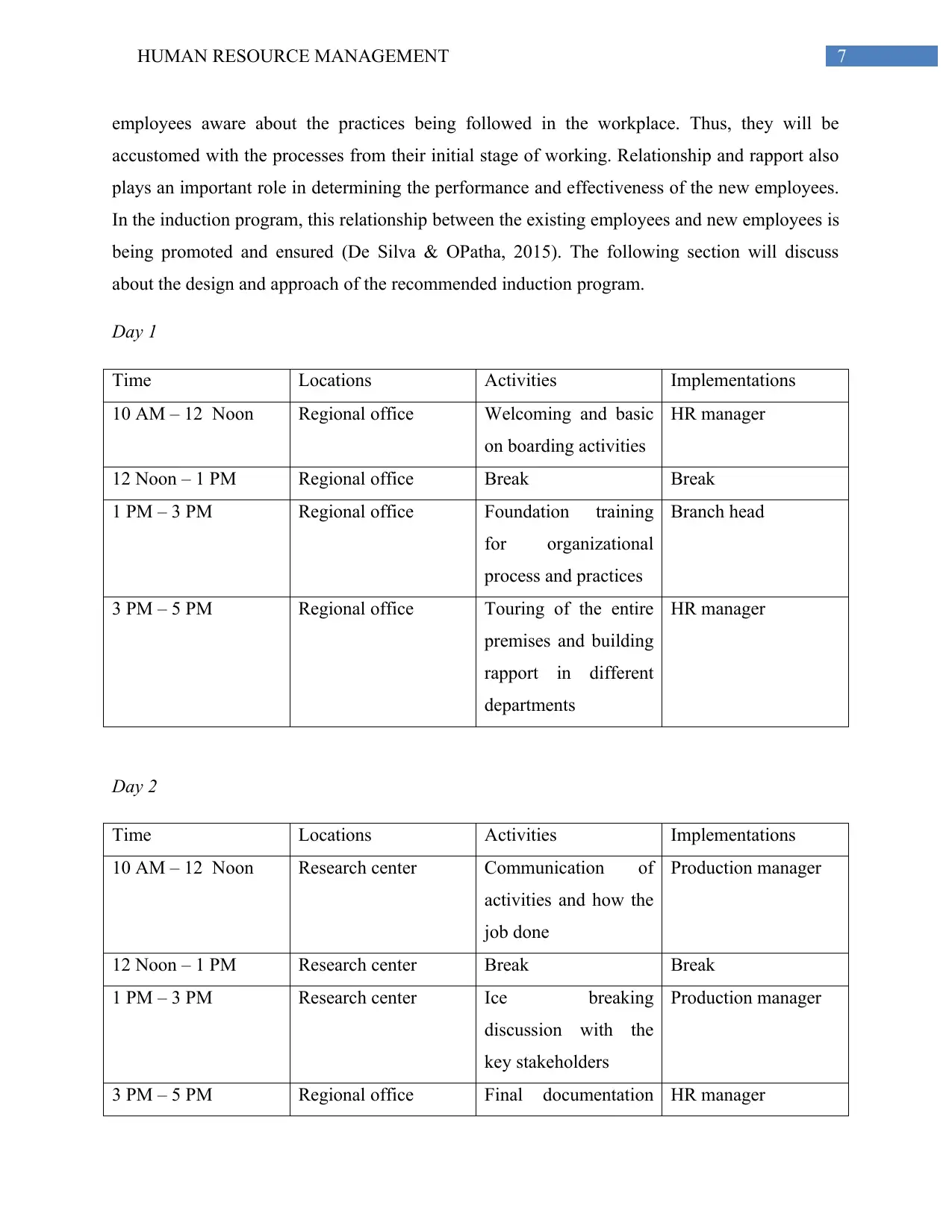
7HUMAN RESOURCE MANAGEMENT
employees aware about the practices being followed in the workplace. Thus, they will be
accustomed with the processes from their initial stage of working. Relationship and rapport also
plays an important role in determining the performance and effectiveness of the new employees.
In the induction program, this relationship between the existing employees and new employees is
being promoted and ensured (De Silva & OPatha, 2015). The following section will discuss
about the design and approach of the recommended induction program.
Day 1
Time Locations Activities Implementations
10 AM – 12 Noon Regional office Welcoming and basic
on boarding activities
HR manager
12 Noon – 1 PM Regional office Break Break
1 PM – 3 PM Regional office Foundation training
for organizational
process and practices
Branch head
3 PM – 5 PM Regional office Touring of the entire
premises and building
rapport in different
departments
HR manager
Day 2
Time Locations Activities Implementations
10 AM – 12 Noon Research center Communication of
activities and how the
job done
Production manager
12 Noon – 1 PM Research center Break Break
1 PM – 3 PM Research center Ice breaking
discussion with the
key stakeholders
Production manager
3 PM – 5 PM Regional office Final documentation HR manager
employees aware about the practices being followed in the workplace. Thus, they will be
accustomed with the processes from their initial stage of working. Relationship and rapport also
plays an important role in determining the performance and effectiveness of the new employees.
In the induction program, this relationship between the existing employees and new employees is
being promoted and ensured (De Silva & OPatha, 2015). The following section will discuss
about the design and approach of the recommended induction program.
Day 1
Time Locations Activities Implementations
10 AM – 12 Noon Regional office Welcoming and basic
on boarding activities
HR manager
12 Noon – 1 PM Regional office Break Break
1 PM – 3 PM Regional office Foundation training
for organizational
process and practices
Branch head
3 PM – 5 PM Regional office Touring of the entire
premises and building
rapport in different
departments
HR manager
Day 2
Time Locations Activities Implementations
10 AM – 12 Noon Research center Communication of
activities and how the
job done
Production manager
12 Noon – 1 PM Research center Break Break
1 PM – 3 PM Research center Ice breaking
discussion with the
key stakeholders
Production manager
3 PM – 5 PM Regional office Final documentation HR manager
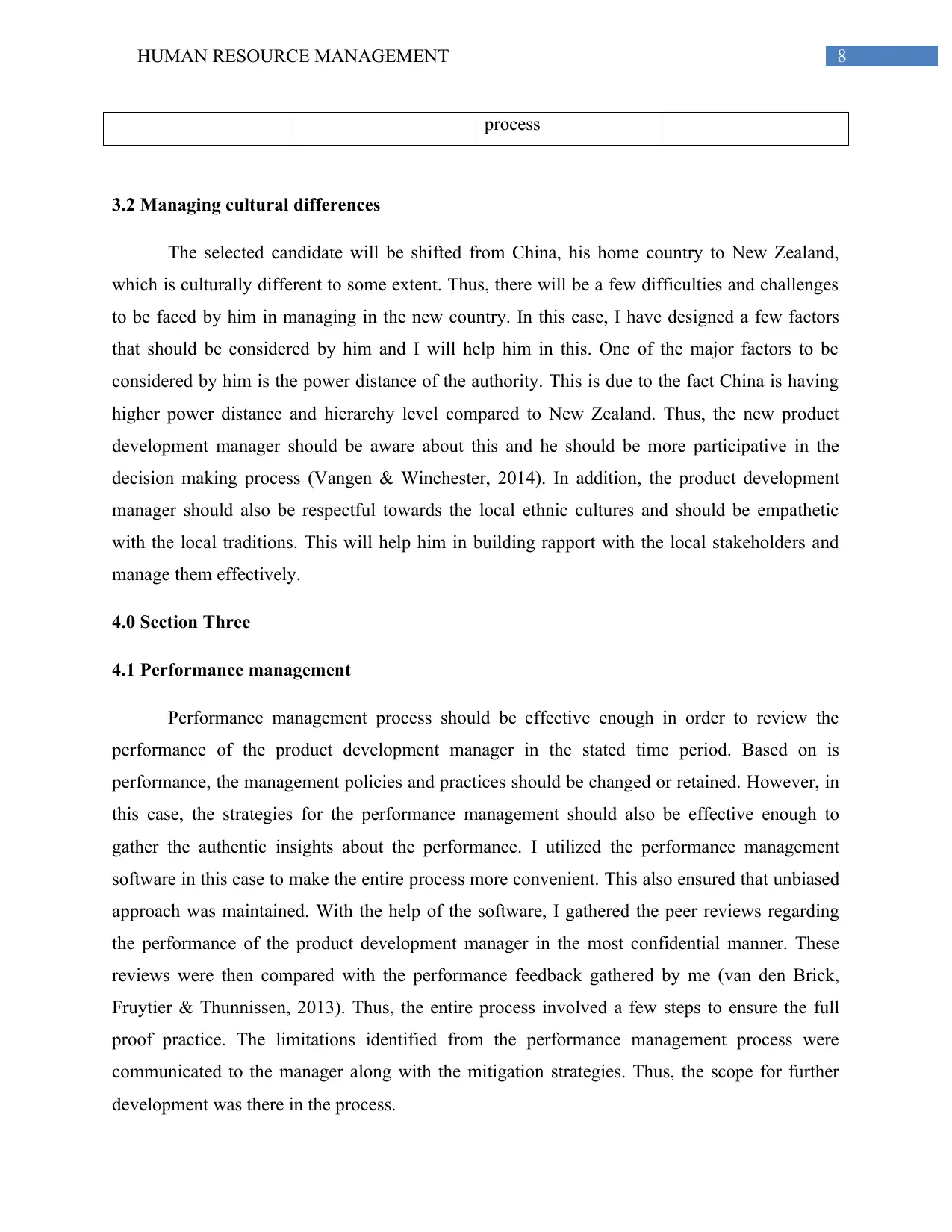
8HUMAN RESOURCE MANAGEMENT
process
3.2 Managing cultural differences
The selected candidate will be shifted from China, his home country to New Zealand,
which is culturally different to some extent. Thus, there will be a few difficulties and challenges
to be faced by him in managing in the new country. In this case, I have designed a few factors
that should be considered by him and I will help him in this. One of the major factors to be
considered by him is the power distance of the authority. This is due to the fact China is having
higher power distance and hierarchy level compared to New Zealand. Thus, the new product
development manager should be aware about this and he should be more participative in the
decision making process (Vangen & Winchester, 2014). In addition, the product development
manager should also be respectful towards the local ethnic cultures and should be empathetic
with the local traditions. This will help him in building rapport with the local stakeholders and
manage them effectively.
4.0 Section Three
4.1 Performance management
Performance management process should be effective enough in order to review the
performance of the product development manager in the stated time period. Based on is
performance, the management policies and practices should be changed or retained. However, in
this case, the strategies for the performance management should also be effective enough to
gather the authentic insights about the performance. I utilized the performance management
software in this case to make the entire process more convenient. This also ensured that unbiased
approach was maintained. With the help of the software, I gathered the peer reviews regarding
the performance of the product development manager in the most confidential manner. These
reviews were then compared with the performance feedback gathered by me (van den Brick,
Fruytier & Thunnissen, 2013). Thus, the entire process involved a few steps to ensure the full
proof practice. The limitations identified from the performance management process were
communicated to the manager along with the mitigation strategies. Thus, the scope for further
development was there in the process.
process
3.2 Managing cultural differences
The selected candidate will be shifted from China, his home country to New Zealand,
which is culturally different to some extent. Thus, there will be a few difficulties and challenges
to be faced by him in managing in the new country. In this case, I have designed a few factors
that should be considered by him and I will help him in this. One of the major factors to be
considered by him is the power distance of the authority. This is due to the fact China is having
higher power distance and hierarchy level compared to New Zealand. Thus, the new product
development manager should be aware about this and he should be more participative in the
decision making process (Vangen & Winchester, 2014). In addition, the product development
manager should also be respectful towards the local ethnic cultures and should be empathetic
with the local traditions. This will help him in building rapport with the local stakeholders and
manage them effectively.
4.0 Section Three
4.1 Performance management
Performance management process should be effective enough in order to review the
performance of the product development manager in the stated time period. Based on is
performance, the management policies and practices should be changed or retained. However, in
this case, the strategies for the performance management should also be effective enough to
gather the authentic insights about the performance. I utilized the performance management
software in this case to make the entire process more convenient. This also ensured that unbiased
approach was maintained. With the help of the software, I gathered the peer reviews regarding
the performance of the product development manager in the most confidential manner. These
reviews were then compared with the performance feedback gathered by me (van den Brick,
Fruytier & Thunnissen, 2013). Thus, the entire process involved a few steps to ensure the full
proof practice. The limitations identified from the performance management process were
communicated to the manager along with the mitigation strategies. Thus, the scope for further
development was there in the process.
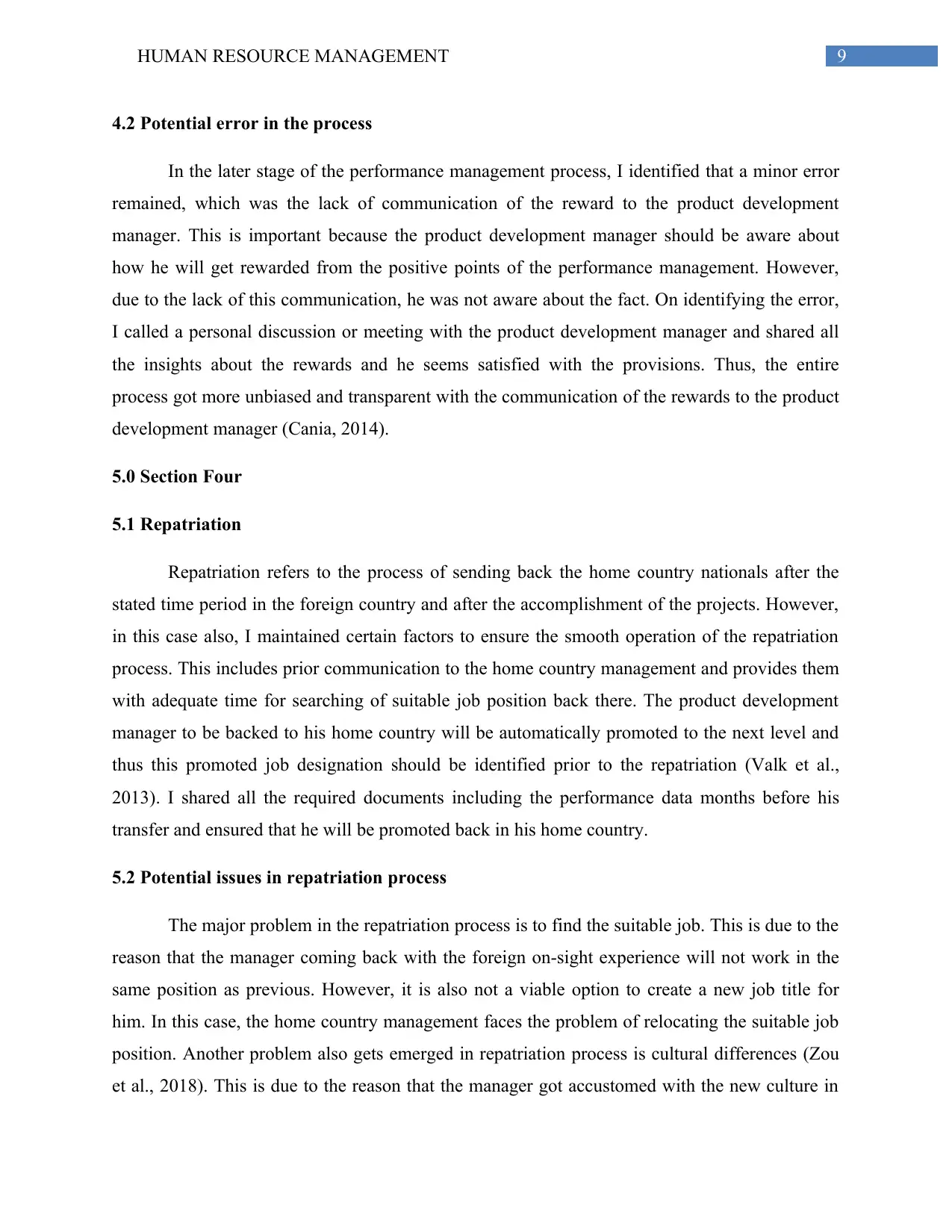
9HUMAN RESOURCE MANAGEMENT
4.2 Potential error in the process
In the later stage of the performance management process, I identified that a minor error
remained, which was the lack of communication of the reward to the product development
manager. This is important because the product development manager should be aware about
how he will get rewarded from the positive points of the performance management. However,
due to the lack of this communication, he was not aware about the fact. On identifying the error,
I called a personal discussion or meeting with the product development manager and shared all
the insights about the rewards and he seems satisfied with the provisions. Thus, the entire
process got more unbiased and transparent with the communication of the rewards to the product
development manager (Cania, 2014).
5.0 Section Four
5.1 Repatriation
Repatriation refers to the process of sending back the home country nationals after the
stated time period in the foreign country and after the accomplishment of the projects. However,
in this case also, I maintained certain factors to ensure the smooth operation of the repatriation
process. This includes prior communication to the home country management and provides them
with adequate time for searching of suitable job position back there. The product development
manager to be backed to his home country will be automatically promoted to the next level and
thus this promoted job designation should be identified prior to the repatriation (Valk et al.,
2013). I shared all the required documents including the performance data months before his
transfer and ensured that he will be promoted back in his home country.
5.2 Potential issues in repatriation process
The major problem in the repatriation process is to find the suitable job. This is due to the
reason that the manager coming back with the foreign on-sight experience will not work in the
same position as previous. However, it is also not a viable option to create a new job title for
him. In this case, the home country management faces the problem of relocating the suitable job
position. Another problem also gets emerged in repatriation process is cultural differences (Zou
et al., 2018). This is due to the reason that the manager got accustomed with the new culture in
4.2 Potential error in the process
In the later stage of the performance management process, I identified that a minor error
remained, which was the lack of communication of the reward to the product development
manager. This is important because the product development manager should be aware about
how he will get rewarded from the positive points of the performance management. However,
due to the lack of this communication, he was not aware about the fact. On identifying the error,
I called a personal discussion or meeting with the product development manager and shared all
the insights about the rewards and he seems satisfied with the provisions. Thus, the entire
process got more unbiased and transparent with the communication of the rewards to the product
development manager (Cania, 2014).
5.0 Section Four
5.1 Repatriation
Repatriation refers to the process of sending back the home country nationals after the
stated time period in the foreign country and after the accomplishment of the projects. However,
in this case also, I maintained certain factors to ensure the smooth operation of the repatriation
process. This includes prior communication to the home country management and provides them
with adequate time for searching of suitable job position back there. The product development
manager to be backed to his home country will be automatically promoted to the next level and
thus this promoted job designation should be identified prior to the repatriation (Valk et al.,
2013). I shared all the required documents including the performance data months before his
transfer and ensured that he will be promoted back in his home country.
5.2 Potential issues in repatriation process
The major problem in the repatriation process is to find the suitable job. This is due to the
reason that the manager coming back with the foreign on-sight experience will not work in the
same position as previous. However, it is also not a viable option to create a new job title for
him. In this case, the home country management faces the problem of relocating the suitable job
position. Another problem also gets emerged in repatriation process is cultural differences (Zou
et al., 2018). This is due to the reason that the manager got accustomed with the new culture in
Secure Best Marks with AI Grader
Need help grading? Try our AI Grader for instant feedback on your assignments.
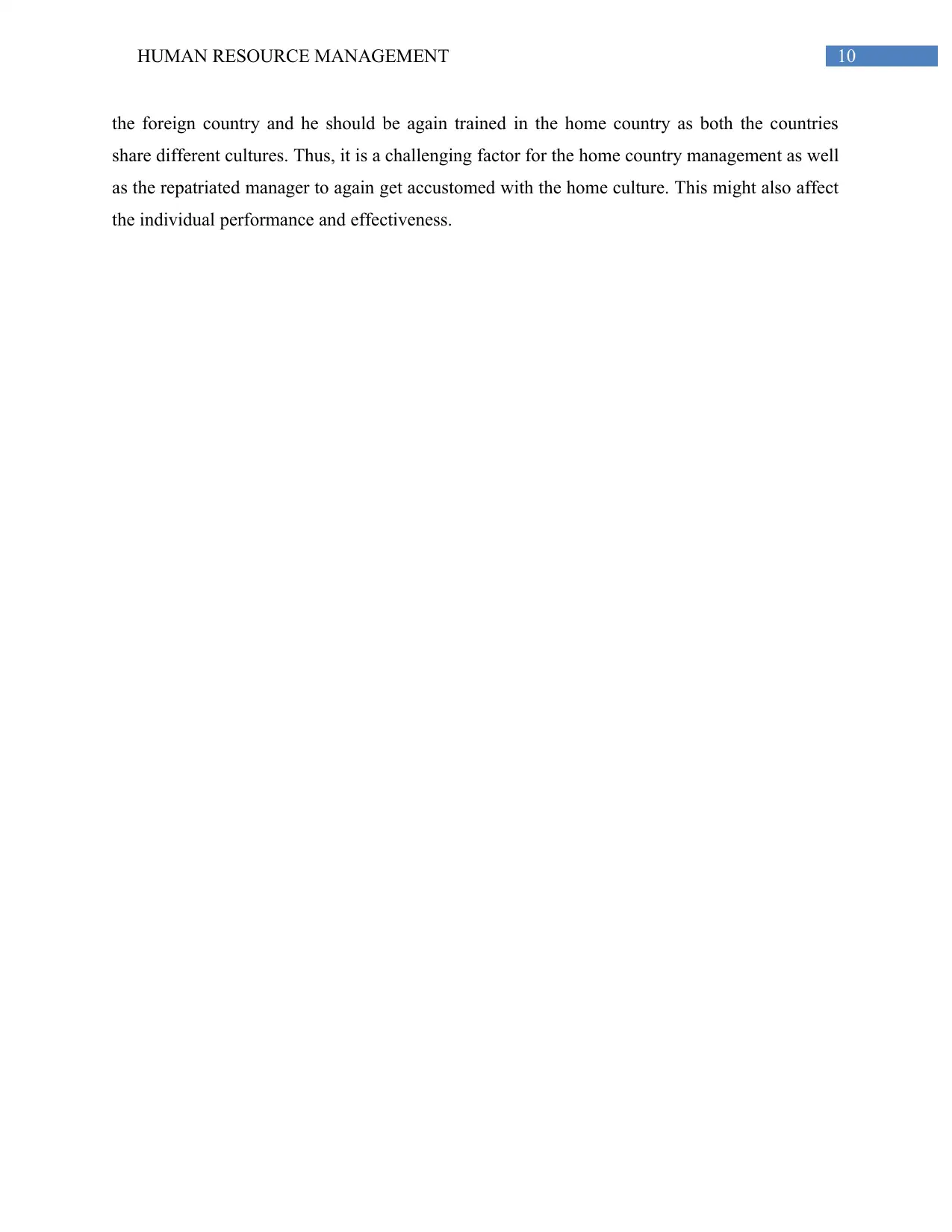
10HUMAN RESOURCE MANAGEMENT
the foreign country and he should be again trained in the home country as both the countries
share different cultures. Thus, it is a challenging factor for the home country management as well
as the repatriated manager to again get accustomed with the home culture. This might also affect
the individual performance and effectiveness.
the foreign country and he should be again trained in the home country as both the countries
share different cultures. Thus, it is a challenging factor for the home country management as well
as the repatriated manager to again get accustomed with the home culture. This might also affect
the individual performance and effectiveness.
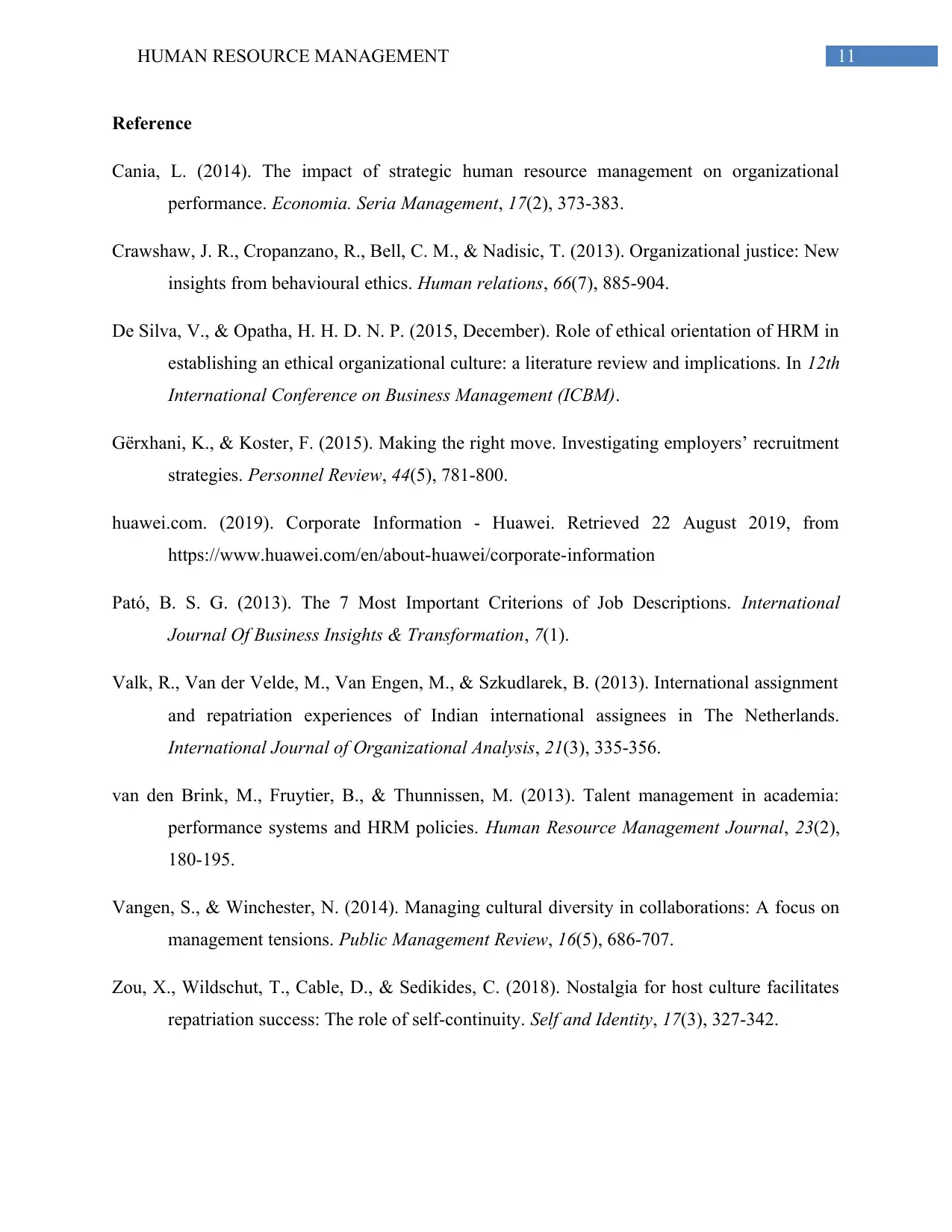
11HUMAN RESOURCE MANAGEMENT
Reference
Cania, L. (2014). The impact of strategic human resource management on organizational
performance. Economia. Seria Management, 17(2), 373-383.
Crawshaw, J. R., Cropanzano, R., Bell, C. M., & Nadisic, T. (2013). Organizational justice: New
insights from behavioural ethics. Human relations, 66(7), 885-904.
De Silva, V., & Opatha, H. H. D. N. P. (2015, December). Role of ethical orientation of HRM in
establishing an ethical organizational culture: a literature review and implications. In 12th
International Conference on Business Management (ICBM).
Gërxhani, K., & Koster, F. (2015). Making the right move. Investigating employers’ recruitment
strategies. Personnel Review, 44(5), 781-800.
huawei.com. (2019). Corporate Information - Huawei. Retrieved 22 August 2019, from
https://www.huawei.com/en/about-huawei/corporate-information
Pató, B. S. G. (2013). The 7 Most Important Criterions of Job Descriptions. International
Journal Of Business Insights & Transformation, 7(1).
Valk, R., Van der Velde, M., Van Engen, M., & Szkudlarek, B. (2013). International assignment
and repatriation experiences of Indian international assignees in The Netherlands.
International Journal of Organizational Analysis, 21(3), 335-356.
van den Brink, M., Fruytier, B., & Thunnissen, M. (2013). Talent management in academia:
performance systems and HRM policies. Human Resource Management Journal, 23(2),
180-195.
Vangen, S., & Winchester, N. (2014). Managing cultural diversity in collaborations: A focus on
management tensions. Public Management Review, 16(5), 686-707.
Zou, X., Wildschut, T., Cable, D., & Sedikides, C. (2018). Nostalgia for host culture facilitates
repatriation success: The role of self-continuity. Self and Identity, 17(3), 327-342.
Reference
Cania, L. (2014). The impact of strategic human resource management on organizational
performance. Economia. Seria Management, 17(2), 373-383.
Crawshaw, J. R., Cropanzano, R., Bell, C. M., & Nadisic, T. (2013). Organizational justice: New
insights from behavioural ethics. Human relations, 66(7), 885-904.
De Silva, V., & Opatha, H. H. D. N. P. (2015, December). Role of ethical orientation of HRM in
establishing an ethical organizational culture: a literature review and implications. In 12th
International Conference on Business Management (ICBM).
Gërxhani, K., & Koster, F. (2015). Making the right move. Investigating employers’ recruitment
strategies. Personnel Review, 44(5), 781-800.
huawei.com. (2019). Corporate Information - Huawei. Retrieved 22 August 2019, from
https://www.huawei.com/en/about-huawei/corporate-information
Pató, B. S. G. (2013). The 7 Most Important Criterions of Job Descriptions. International
Journal Of Business Insights & Transformation, 7(1).
Valk, R., Van der Velde, M., Van Engen, M., & Szkudlarek, B. (2013). International assignment
and repatriation experiences of Indian international assignees in The Netherlands.
International Journal of Organizational Analysis, 21(3), 335-356.
van den Brink, M., Fruytier, B., & Thunnissen, M. (2013). Talent management in academia:
performance systems and HRM policies. Human Resource Management Journal, 23(2),
180-195.
Vangen, S., & Winchester, N. (2014). Managing cultural diversity in collaborations: A focus on
management tensions. Public Management Review, 16(5), 686-707.
Zou, X., Wildschut, T., Cable, D., & Sedikides, C. (2018). Nostalgia for host culture facilitates
repatriation success: The role of self-continuity. Self and Identity, 17(3), 327-342.
1 out of 12
Related Documents
Your All-in-One AI-Powered Toolkit for Academic Success.
+13062052269
info@desklib.com
Available 24*7 on WhatsApp / Email
![[object Object]](/_next/static/media/star-bottom.7253800d.svg)
Unlock your academic potential
© 2024 | Zucol Services PVT LTD | All rights reserved.





